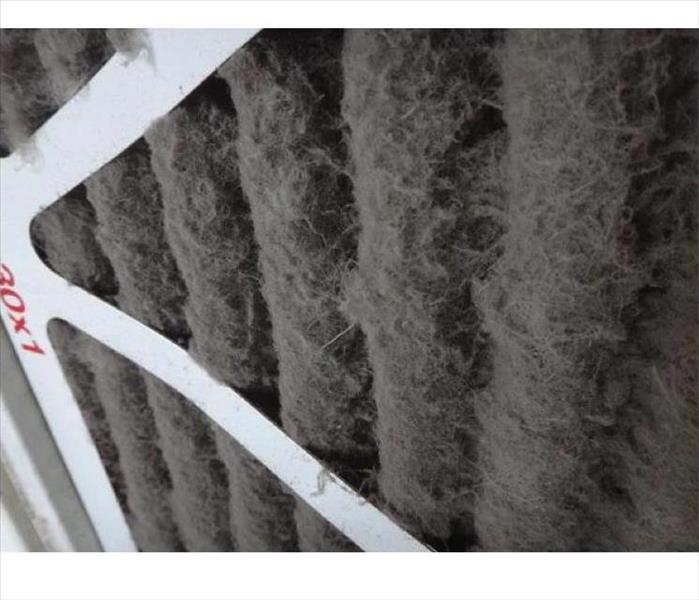How Often Should You Change Your Furnace Air Filter?
1/9/2017 (Permalink)
“I only change my furnace filter when it looks dirty.” Although this is a common assumption of how to know when to replace a furnace filter, it is not good advice. If you can see a buildup of particulates on your filter then it should have most likely already been replaced. A dirty filter not only reduces the efficiency of your furnace but more importantly, negatively impacts the quality of the air you and your family breathe.
But how do you know when to change your filter? The correct answer is: it depends. Many manufacturers recommend that you change your furnace filter every three months. But this is only meant as a guideline. As you might have guessed, every household is different.
A variety of factors may determine how often you change your filter. They include the type of filter, specific conditions in the home, and furnace usage patterns, to name just a few.
If you’re looking for a quick and simple answer to when to replace your furnace filter, skip on down to the “Basic Guidelines …” section. But if you’re the inquisitive sort that wants to know everything there is to know about furnace filters, well, you’re on the right site. Feel free to read on.
DO YOU NEED TO CHANGE YOUR HVAC FILTER?
Air filters in your home central heating/cooling unit don't last forever. They filter dust, pollen, bacteria and mold from your air, so what you breathe is clean. A clogged-up air filter kills your unit's energy efficiency. If neglected long enough, it can send air pollutants, dust and spores all over your house, and can eventually clog the vents as well. Clogged vents can cause pressure to build up, causing leaks in several places over time, which effectively defeats the purpose of having them. If you have recently discovered having allergies, or sinus or breathing issues, it could be due to not having clean air running through your house.
Additionally, having your system running efficiently helps it do its job better in extreme weather. During the summer, when you're faced with extreme heat, a cleaner air filter is going to allow your AC to run more efficiently, keeping you safe, and costing you less. During the winter, clean filters will help you stay heated without your central heating system working too hard, saving the motor and again, saving you money.
FACTORS CONTRIBUTING TO FILTER REPLACEMENT
Not all homes are alike, a number of factors can determine when to change the air filter. The type of filter, the number of occupants in the home, the number of pets, the amount the furnace/AC is used, and whether or not doors and windows are left open are some of the main factors to consider when deciding to change an air filter. Be aware of the size and thickness of the filter as well, as it will contribute to the filter’s effectiveness and lifespan.
In addition to these factors there are individual needs and preferences to consider when deciding to change an air filter. For instance, if a person in the home has Asthma, severe allergies, or other respiratory conditions changing the air filter more frequently is recommended. A fresh filter can help relieve or prevent some potential issues and should be considered when determining a timeframe for filter replacement.
BASIC GUIDELINES FOR REPLACING A FURNACE FILTER
As mentioned earlier, a number of factors will determine when to change your furnace filters. However, below are some guidelines you can use as a general reference.
- Average suburban home w no pets – 90 days
- Average home w pet – 60 days
- More than one pet or allergies – 30-45 days
- Vacation home or single occupant (no pets, no allergies) - up to 6 months
There you have it. When to change your furnace filter depends on more than the thickness and appearance of the filter. Although every three months is the standard, it will ultimately depend on a variety of individual factors. But in general, it is a good idea to err on the side of caution. Changing your filter more often will only ensure the quality of the air you breath while also saving you money on the operation of your furnace.





 24/7 Emergency Service
24/7 Emergency Service